Jeff
Professor of Psychology · Lincoln, Nebraska
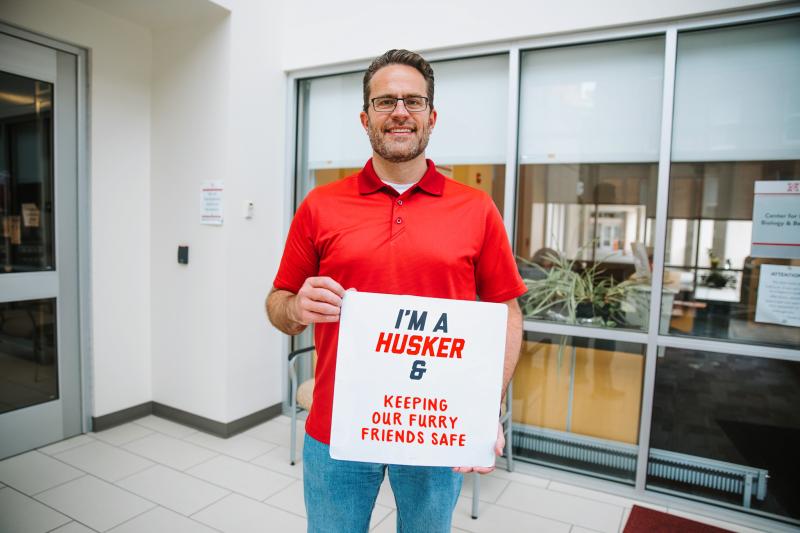
As much as we may love fireworks, it’s hard to enjoy the Fourth if we know our furry friends are struggling with the noise. Jeff, director of the Canine Cognition and Human Interaction Lab in the Center for Brain, Biology & Behavior, is offering ways to help our four-legged friends cope with the commotion.
In the short term, Jeff says creating a safe space is the best option for both dogs and owners.
"Let them hide in the closet or under the bed if that’s where they feel safe. Play white noise or calming music to drown out the fireworks and be there to comfort them."
The lab, which focuses on understanding canine cognition and exploring the bond between dogs and humans, helps Husker researchers better understand the special relationship we have with our pets.
"Interacting with a dog, even for just five minutes, can reduce stress and improve mood," Jeff says. "One study shows that both dogs and owners get a boost of oxytocin — which is kind of thought of as the love hormone — after they interact, suggesting this bond is a two-way street."
While programs like Husker Pawp-Ups feel like everyday examples of this idea, the real research takes place in the lab with volunteer dog owners who bring their dogs for “studying.”
"We have dog owners bring their dogs to campus and play games for treats," Jeff explains. "These games help us learn about the dog's behavior and cognition, how they see the world, and how they think."
And for dog owners looking to take long-term steps to help reduce their pets’ stress around the Fourth of July, Jeff suggests helping them ease into the noise levels.
"If you prefer not to medicate, training to desensitize dogs to loud noises can be effective,” he says. “Start with low-volume recordings of fireworks or thunderstorms, reward calm behavior and gradually increase the volume."
It's also important to prevent dogs from running away, a common issue on the Fourth.
"Make sure your dogs are inside and can't accidentally run out. Ensure they have a collar with your phone number and are microchipped, just in case."
Kevin
Associate Professor of Practice · Dayton, Ohio
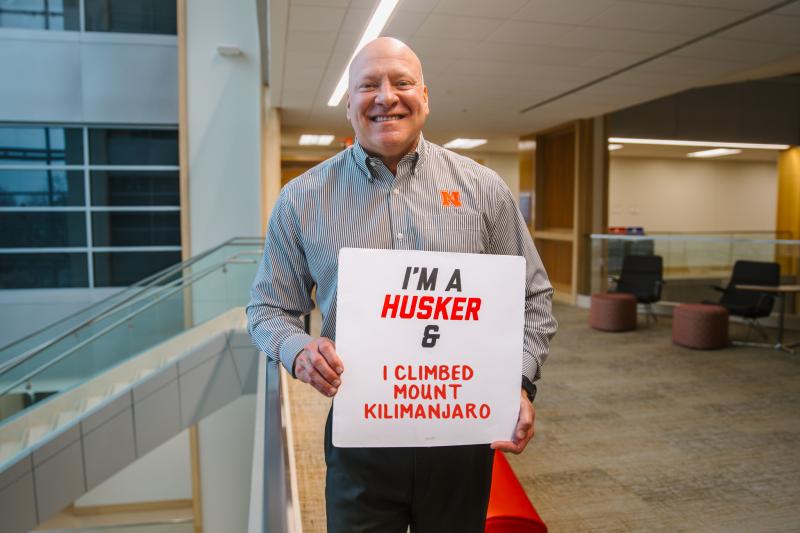
Dr. Kevin Wesley of the College of Business is not one to shy away from an opportunity to stretch his strengths and grow as a leader and team member. It’s something he talks about in his Business Honors Academy course and an ethos he acquired as a US Navy veteran with 24 years of service.
It’s also what led him to climb Mt. Kilimanjaro, the highest freestanding mountain in the world, last summer.
“I just really enjoy adventure. I wanted to go to Africa, I wanted to see the wildlife and the Serengeti and all those things,” says Kevin. “And I do like to push myself.”
It was an adventure a long time in the making for Kevin, who was slowly persuaded by his friend Robert Kay — an avid climber and regular guest speaker in Kevin’s classes — to take up the challenge. Kevin brings Robert to speak to his classes as part of an exercise that examines the 1996 Mount Everest disaster and a subsequent case study from Harvard Business.
The segment culminates in lessons on leadership.
“Robert was slowly pushing me to make a climb like this over the years, and eventually I thought, ’Well, I’m not getting any younger.’”
Kevin trained for months ahead of his 9-day excursion, climbing multiple 14,000-foot mountains in Colorado to adjust his body to the extreme elevations. Then, late in July, Kevin set out with 7 others to summit Mt. Kilimanjaro.
“It was a bit tougher than I’d anticipated,” he admits. “We spent over 3 days between 16,000 and 18,000 ft. just to give your body a chance to acclimate, even though it really doesn’t.”
That adjustment period is necessary when it comes time to ascend to the peak, or “varsity day,” as Kevin calls it.
“You wake up at 3am on summit day and get back to camp at 8pm. So, it’s a no-kidding rough day — it’s definitely earned my respect,” he joked.
When he did finally summit the mountain, Kevin found himself reflecting on the same values he shares in his classes — being a team player.
“It reinforces that in high-stress situations, you really come to rely on your team members. Everything starts and ends with relationships.”
“Everything starts and ends with relationships.”
Jemalyn
Assistant Professor of Practice in Advertising ·
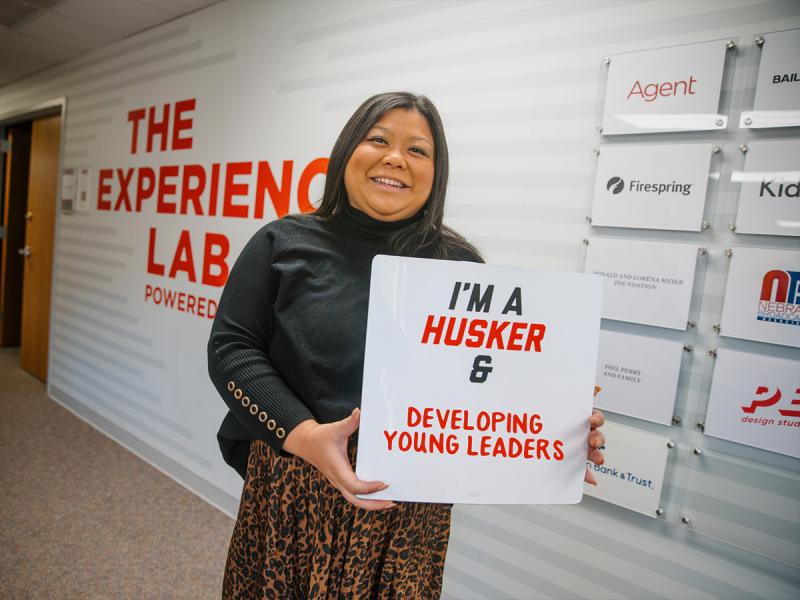
Last week, Jemalyn earned her five-year service award at UNL’s celebration of service. It marks her second five-year run at Nebraska, two stretches that — split in half by a digital marketing leadership role at Harvard — have had impacts as wide and varied as Jemalyn’s own experiences.
“In all my roles across my career, the common thread is developing young leaders and seeing them change and influence new generations,” says the College of Journalism & Mass Communications professor. “That’s really what drives me to do what I do.”
Jemalyn first began at Nebraska in 2013 as assistant director of recruitment for Hixson-Lied College of Fine & Performing Arts before serving as the marketing and communications director for UNL Grad Studies. Her significant PR experience in her home state of California translated seamlessly to recruitment.
“It was a natural progression for me that also allowed me to mentor young people and see them evolve as leaders — and that really got me fired up.”
UNL’s mission — and belief in the power of every person — also got her fired up.
“Being first-gen and growing up low-income, you learn to take education seriously because you realize it’s a path to make your life better. Education has literally changed my life and my family’s life,” she explains. “That’s why I love land-grant institutions like UNL: they’re meant to serve the people.
A co-creator and co-director of CoJMC’s Experience Lab and executive director for Jacht, Jemalyn has helped create countless hands-on experiences for Huskers across marketing, journalism and PR fields.
“That was my baby,” she says. “We were in there painting, moving furniture — I tell my students that innovation is messy.”
Jemalyn’s work in the classroom is guided by the same sense of service that first attracted her to UNL.
“Jacht worked with a farmer who started a business building high-end cutting boards and helped him raise $250,000,” she says. “Talk about changing a Nebraskan’s life. That’s the power of experiential learning. You’re not just talking about things theoretically — you’re implementing them.”
“In all my roles across my career, the common thread is developing young leaders and seeing them change and influence new generations That’s really what drives me to do what I do.”
Brittany
Research Assistant Professor · Oakland, Nebraska
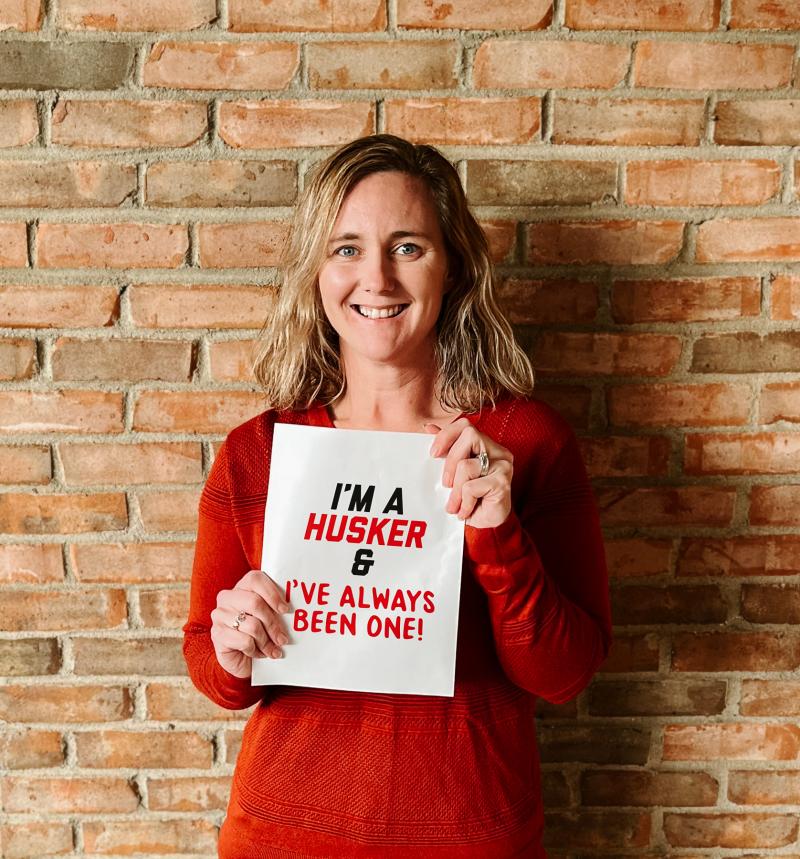
Many of us feel a strong connection toward UNL, but Brittany, a Research Assistant Professor in the Center on Children, Families, and the Law (CCFL), can claim something that few others can: she’s been a Husker since preschool.
When she was four years old, Brittany attended a head start program at the Barkley Center on East Campus. She later returned to UNL as an undergraduate in the Child, Youth and Family Studies program, where she found research opportunities that inspired her to pursue a career in academia.
“I participated in the McNair Scholars Program, which helps first-generation or underrepresented minority groups get into academia,” explains Brittany. “The McNair program introduced me to academic research, which I ended up really enjoying and is what set me on the path to pursuing a PhD.”
The research Brittany participated in as an undergraduate focused on substance use and homelessness, a community service-oriented field that resonated with her. Her desire to further engage in this line of research would eventually lead her away from Nebraska – though not permanently.
“I went to graduate school at Ohio State, and that’s where I got my PhD in Couple and Family Therapy. But it was always my hope that I would be able to move back to Nebraska and build a career there.”
Now with the CCFL, Brittany applies her research – centered on youth experiencing homelessness – to the Lincoln and UNL communities that have helped her get to where she is now.
“It’s a meaningful fit for me because a lot of the work at CCFL is about improving the systems of care for disadvantaged groups in Lincoln,” says Brittany. “Thinking about myself growing up in a disadvantaged family, it feels good to now be in a position to improve the systems that help families like mine.”
Brittany remains thankful for the opportunities she received through UNL that have allowed her to bring things full circle and give back to the Husker community.
“It feels good to show that these programs work, because they really are made to help students.”
“Thinking about myself growing up in a disadvantaged family, it feels good to now be in a position to improve the systems that help families like mine.”
Aaron
Director of Cornhusker Speech & Debate · Lincoln, Nebraska
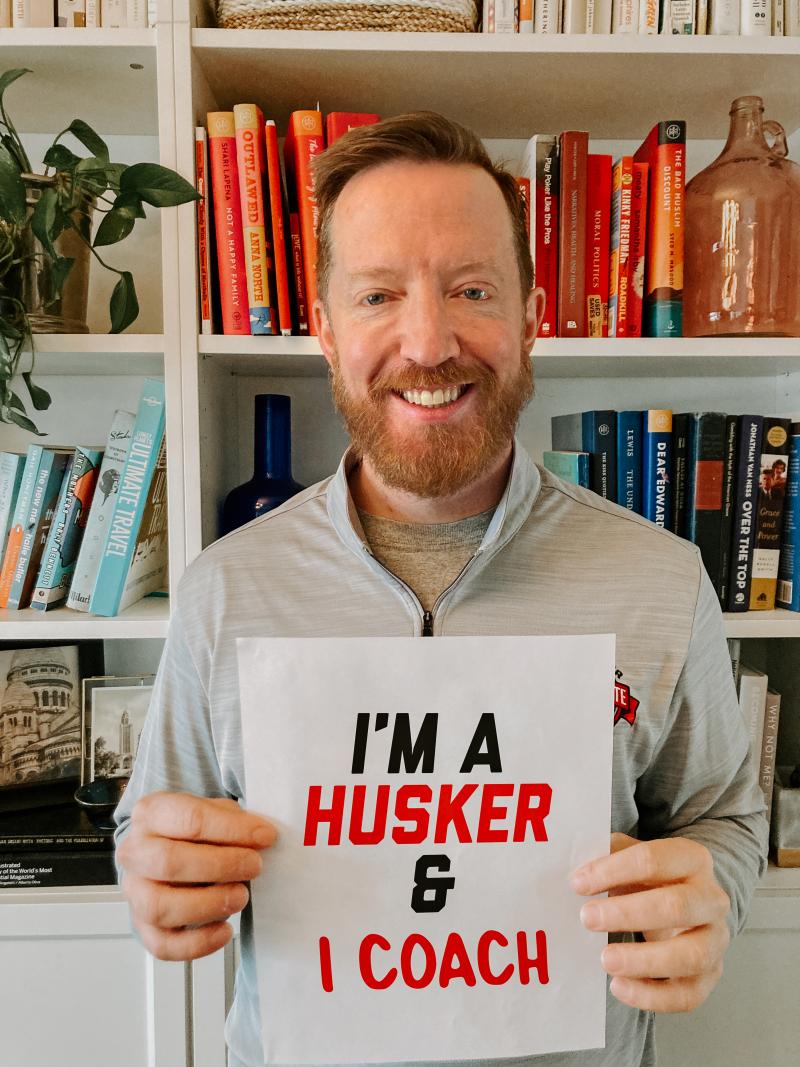
Since its inception 151 years ago as the Palladian Debate Society, the Cornhusker Speech & Debate team has grown into a nationally recognized program that regularly produces Big Ten and national champions.
Dr. Aaron Duncan is the director for Cornhusker Speech & Debate and has been with the team since 2005. When he first came to UNL, he was familiar with the group’s impressive history and their famous former teammates like speechwriter Ted Sorensen.
Aaron and his fellow coaches develop students from a variety of majors for speech and debate competitions. Students competing in speech perform prepared pieces ranging from persuasive and informative speeches to poetry performance. They may also compete in extemporaneous or impromptu speeches where they are given anywhere from two to 30 minutes to draft a speech based on a current event or quotation. Or, students may compete in the debate round, where they research a specific topic for the entire speech season and go head-to-head against other teams.
“We've debated agricultural policy alternative fuels, immigration policy, diplomacy with China,” Aaron said. “All sorts of different topics.”
This April, Aaron and the Cornhusker Speech & Debate team will host the best of the best speech and debate students from across the country at the annual National Speech Tournament. While the Huskers are excited to share their campus with their competitors, they also look forward to defending their status as one of the nation’s top teams. But while the awards and accolades are rewarding, Aaron loves speech and debate for more than just that.
“Teaching students that mindset of resiliency — to be process-focused, to do great research, to think critically and to strive for constant improvement, is really the outcome that we're seeking as an educational activity,” Aaron said. “And then most of all, we also just want it to be fun.”
Marianna Burks
science learning specialist, biology instructor and educational sciences PhD student · Baton Rouge, Louisianna
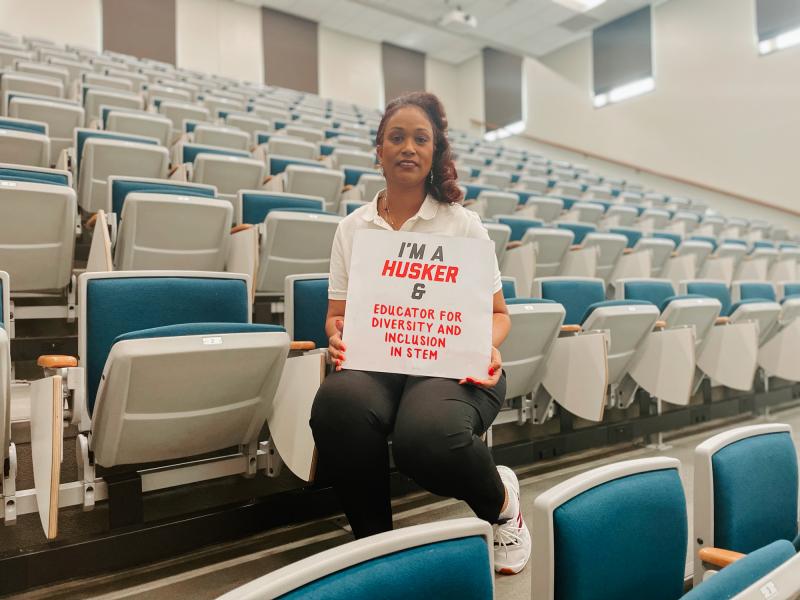
Marianna is making science accessible to all students.
“I tell my students, whatever you experienced in biology or science before you have taken my course...throw it out the window,” Marianna said. “We are going to reset all of the experiences that you may have had if they were negative in science and biology.”
As an instructor for BIOS 101 and LIFE 120, she’s dedicated to helping students overcome their struggles in science and realize their capacity for success in the subject.
“I can have students that are straight-A students that say, ‘Mrs. Burks, I don't think I'm good at science.’ And I’m like, ‘What do you mean you’re not good at science? You’re doing great. But, in terms of if they feel fulfilled in their ability to do science, that's very different from a student's ability to be successful just in college.”
To help her students feel empowered by their abilities, Marianna takes on the role of both instructor and mentor. She forms personal connections, shows them the tools they need to succeed, and cheers them on even after the semester is over.
“I enjoy the relationships we develop during our time in the semester, and the other thing is that those students always come back to me.”
Her teaching method is also the driving force behind the research she is doing for her dissertation, titled, “An Assessment of the Relationships Critical in Developing Science Self-Efficacy in First-Generation Undergraduate College Students.”
Marianna’s impact is clear — and the cards she proudly displays in her office from former students prove that her empathy and enthusiasm-led teaching style is effective.
“My passion every day has been to educate the students and serve them...what has been rewarding about what I do is even just the thank-you's that I get.” Marianna said. “I have hundreds of thank-you cards...that has also been the reward, to see their journeys, to watch their journeys and to know that I was a part of influencing their journey.”
“I enjoy the relationships we develop during our time in the semester, and the other thing is that those students always come back to me.”
James Brunton, PhD
Assistant Professor of Practice ·
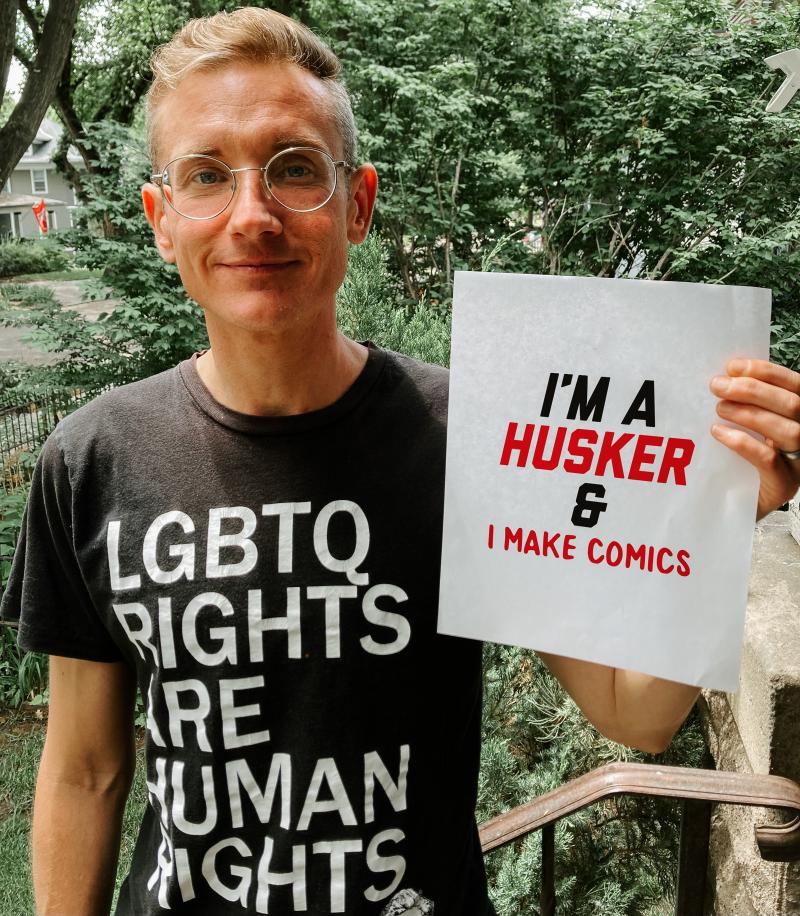
Though James’s academic background is in English and poetry, he recently started pursuing a new passion: comic book writing.
As he put pen to paper toward his newest poems, the doodles that he made in the margins of his notes started to become key elements of his writing. His love for poetry bled into a new art medium of pencil-drawn comics and illustrations.
"All forms of art are interconnected, so whether you are writing or drawing or painting or sculpting or filmmaking," James said. "At the heart of it is this strive to create something in the world that wasn't there before."
James's comic book adventures started as scratches and doodles, but now they've become an art of their own. The project, titled "From the Neck Up," was recently featured at the Sheldon Museum of Art in the "Person of Interest" symposium.
The comics give a personal look at James's perspective as he transitioned genders. They capture raw feelings and real moments, all because James was using the artistic medium to decompress. He channeled the stress and anxiety he felt at the time into his work and found a space that allowed him to be honest and vulnerable.
James hopes to one day be able to publish "From the Neck Up," but he's not in any hurry. He's happy with what he's created and the community he's found. He doesn't need a published book to make this memory meaningful — because he's already found it.
"If this is something I enjoy, even if it never sees the light of day, even if I don't get great at it — it's still something that is meaningful to me, and it's something that's helping me have new thoughts and work through old thoughts," James said. "And I just decided to let that be enough."
“At the heart of it is this strive to create something in the world that wasn't there before.”
Rick Alloway
Associate Professor of Broadcasting ·
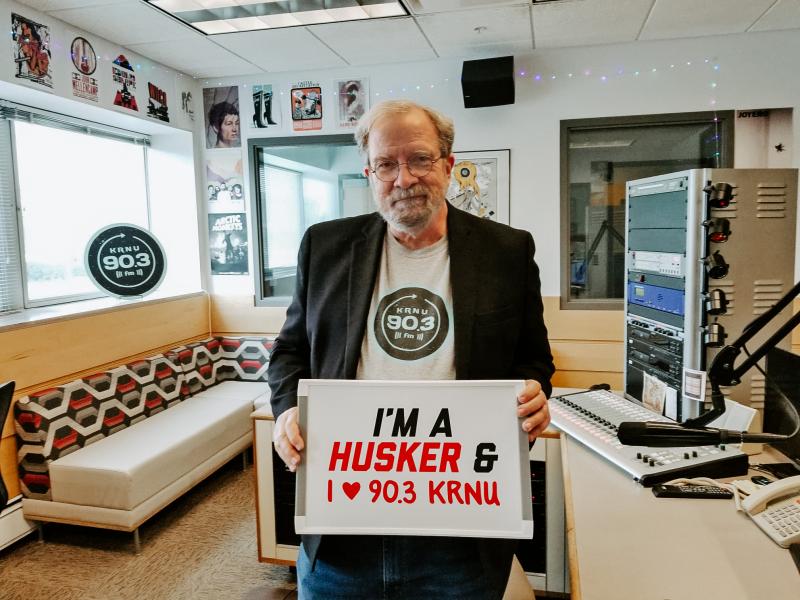
From vinyls and cassette tapes to CDs and streaming services, 90.3 KRNU has seen it all.
The campus radio station has been a fixture at the College of Journalism and Mass Communications since 1970. Back then it was housed in Nebraska Hall and could only be heard in residence halls through the campus electrical system. Now, KRNU has a full-service radio space in Andersen Hall that can be heard on the radio and on two online stations.
Professor Rick Alloway’s voice aired on 90.3 KRNU for the first time in 1973. He was a first-year student looking for experience in broadcasting and was given the chance to do that right away through the College of Journalism & Mass Communications.
“It's a testimony to the fact that the college has always felt very strongly about letting you do right away what it is that you came here to do,” Rick said. “It's that hands-on from day one kind of attitude that we've always had.”
After graduating from the University of Nebraska–Lincoln and working for a few years, he eventually found his way back to KRNU in 1986. Since then, Rick has seen thousands of students try on the KRNU headphones and get behind the microphone. He’s also led the station through format changes — from playing Top 40 hits, to becoming an independent music station, to expanding the station’s life coverage of sports to the web.
KRNU has endured through decades of world-changing events, but it never operated through a pandemic until this year. While student broadcasts stopped in March 2020, Rick and the KRNU team created safety measures that allowed students to return to the studio last fall. Some students were even able to remotely cover their shifts from home, which allowed the college and the students to learn a new set of broadcasting skills.
After adapting to a year full of change, UNL’s standalone student radio station will be back to broadcasting student voices full-time this fall. Whether they’re in the studio or at home, Huskers will be contributing to a 51-year Husker tradition.
“It's that hands-on from day one kind of attitude that we've always had.”
Michael Farrell
Coordinator ·
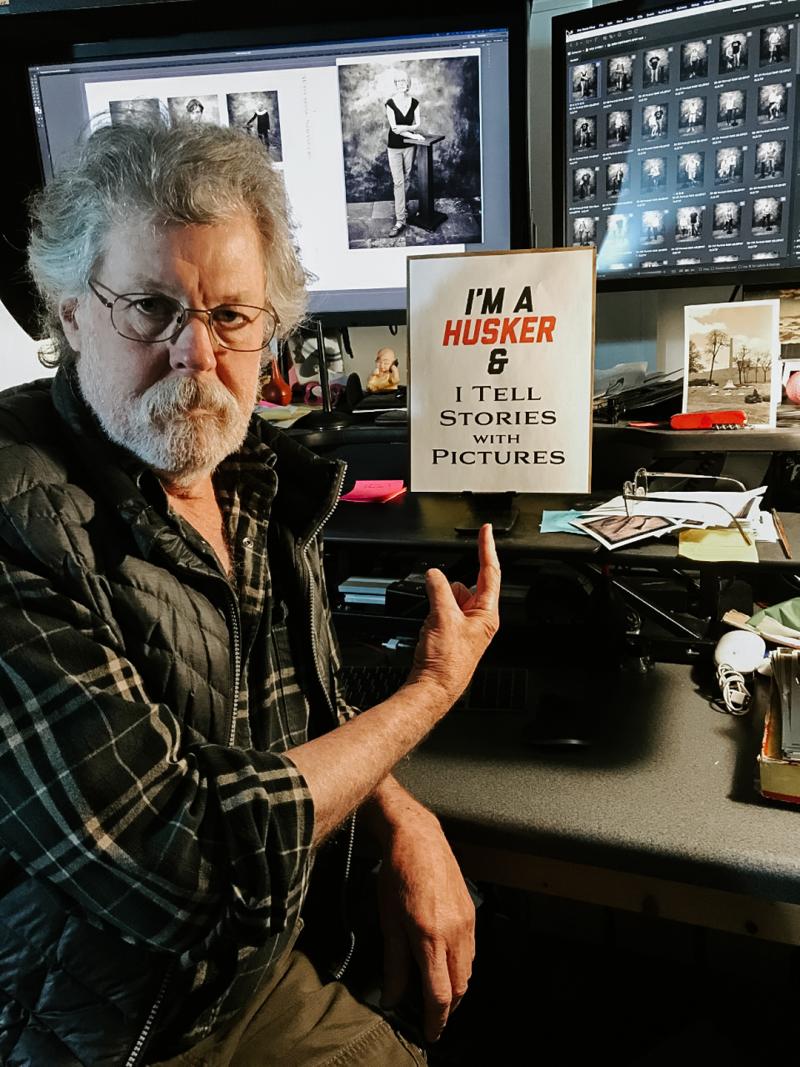
As people retreated home to practice social distancing early last spring, their newfound free time led to a bevy of creative projects and pursuits. Some tried baking bread for the first time. Others picked up a new craft like crocheting or knitting. And a few folks, like Michael Farrell, created something that would immortalize the unique moment in time.
Using a glass plate camera, Michael collected the portraits and perspectives of friends old and new. All the photos were taken in Michael's backyard, where he created an outdoor photo studio that would allow the photos to be taken safely with social distancing.
After posting on Facebook inviting his friends and followers to partake in the series, he was shocked to see portrait requests flow in from more than 90 different individuals. Some were complete strangers he had never met before and others were longtime friends and colleagues — including a handful from Michael's time at the University of Nebraska–Lincoln.
His work, now known as the Pandemic Portrait Project, is being turned into a book. Each portrait is paired with a written perspective from the photo subject about COVID-19 — with some quotes as lighthearted as noting how long it had been since the author's last haircut, to deeper revelations over the sadness of being unable to see at-risk family members.
"You're listening to this stuff like this and you're thinking, 'This is this is pretty rough stuff,'" Michael said. "People's motivations to be a part of this were all very individual and unique — and that's kind of what makes it interesting."
Ryan Sullivan
Clinical Associate Professor · Oshkosh, Nebraska
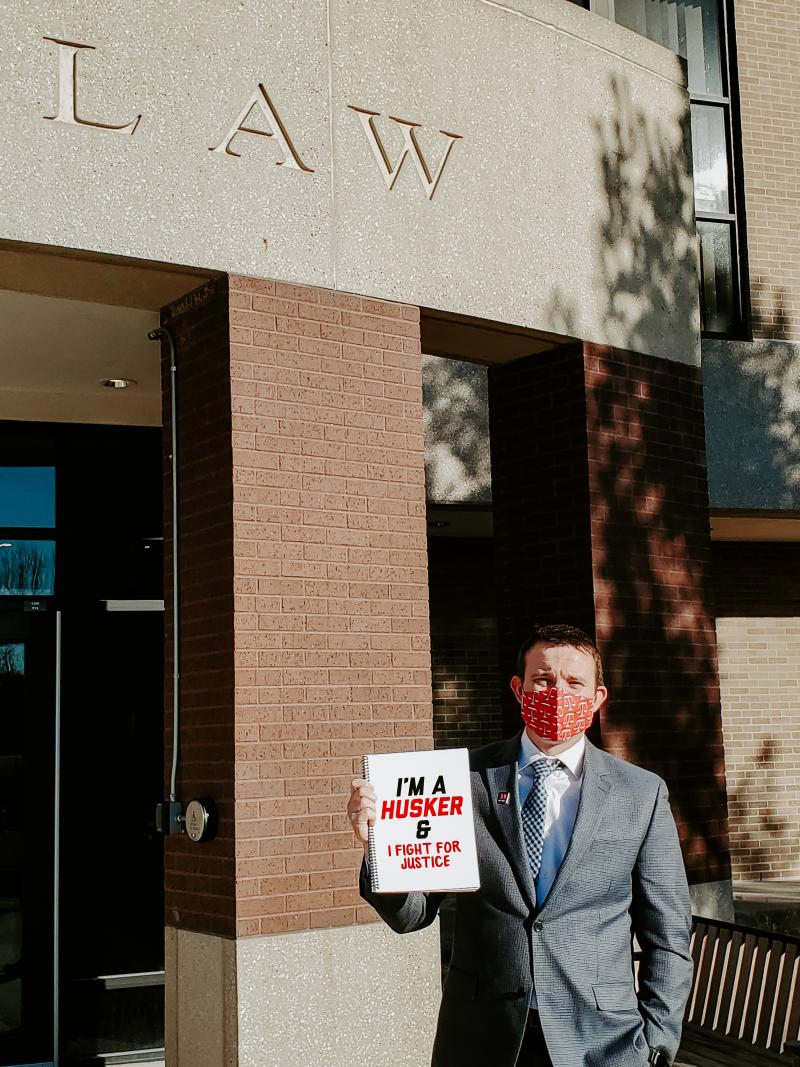
After serving in the military and completing his bachelor’s degree, Ryan Sullivan purchased a small health club in Texas. As a business owner, he served on the boards of several nonprofit organizations and was exposed firsthand to the lack of affordable legal services available to underserved populations.
After that, he made the decision to sell his business and he set off to pursue a career in law. His upbringing emphasized community service and providing for those less fortunate. And growing up relatively poor himself gave him a perspective that guides him in understanding the plight of those who don’t have resources to take advantage of the rights and opportunities available to others.
Now, he's fulfilling that at the local level in helping fight the eviction crisis through the Tenant Assistance Project (TAP) which is making the eviction process more fair.
"It encourages the landlord to engage in a dialogue with the tenant in an effort to work out a mutually beneficial arrangement instead of jumping straight to filing an eviction."
In most cases, TAP volunteer attorneys and student attorneys are able to assist the tenant in getting the action dismissed, or negotiating for additional time to find a new, safe place for their family to live.
In addition to helping tenants directly, Ryan also supervises Nebraska Law students as they conduct preliminary evaluations, represent tenants who appear for their hearing, and make TAP the success it is today. He enjoys seeing his students transform from green, rising third years to full-fledged student attorneys who can capably and confidently defend the rights of their clients.
"My role at the College of Law is innately motivating. I am in a position where I can use my law license and practice experience to help those in need, to guide students in helping those in need, and to mentor future Nebraska attorneys as they complete the clinical component of their legal education—it is pretty hard not to be motivated in this environment."
“I am in a position where I can use my law license and practice experience to help those in need, to guide students in helping those in need, and to mentor future Nebraska attorneys...”
Jesse
Assistant Professor ·
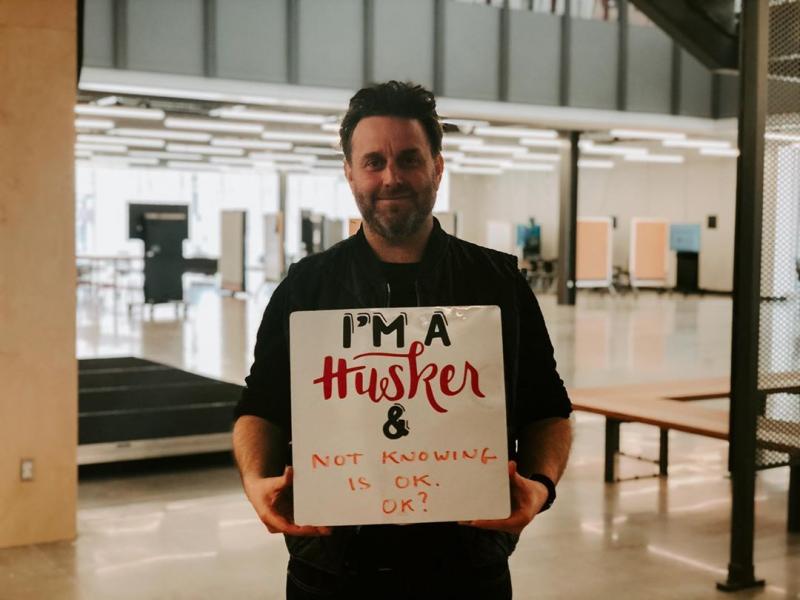
For more than 10 years, University of Nebraska–Lincoln professor Jesse Fleming has been teaching others about mindfulness. Jesse describes mindfulness as a practice, an awareness and a state of being that allows people to learn about themselves and the world. Along with providing the benefits of a deeper understanding of oneself and the world, mindfulness and meditation can also have an effect on health, according to Jesse. Clinical proof shows that the practice of meditation can help with stress reduction, anxiety and more. At the new Johnny Carson Center for Emerging Media Arts, Jesse uses his expertise in the field of mindfulness to aid in his exploration of the constantly-developing world of media creation. He runs the Perceptual Technologies Lab, where he researches and creates immersive perceptual experiences centered on mindfulness. And when he's not stretching his strengths in the lab identifying new technologies, Jesse can be found teaching others about the practice of mindfulness. Every Monday he hosts the Mindfulness Meditation Drop-In Series. The series gives students, faculty and staff the opportunity to learn and practice mindfulness with Jesse and others in an accepting group environment. "I feel very...touched and open to everyone who comes through the door for these sessions," Jesse said, "Because I know that is says, 'we're all going through stuff, we're all looking for a release, and we're willing to give something a try.'"
“At the new Johnny Carson Center for Emerging Media Arts, Jesse uses his expertise in the field of mindfulness to aid in his exploration of the constantly-developing world of media creation. ”
Tom
Associate Professor of Entomology · Waverly, Nebraska
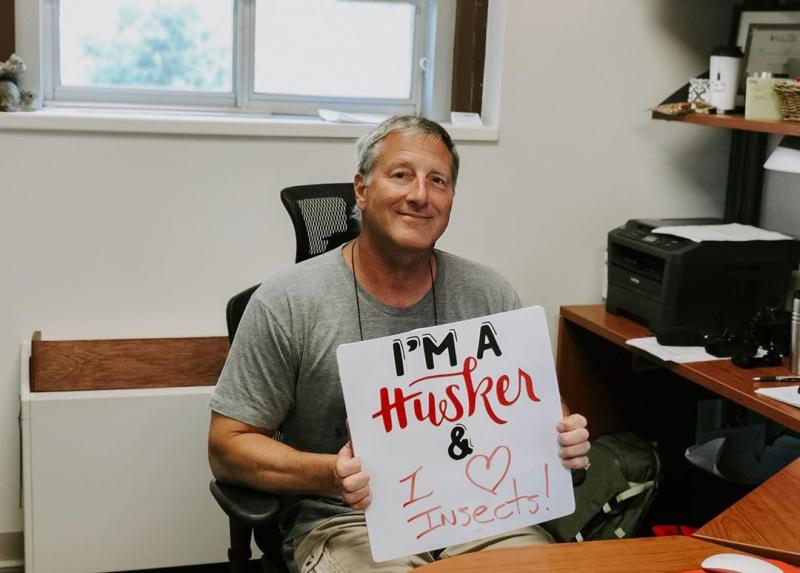
Everyone has something they're passionate about. For associate professor Tom Weissling, that something happens to be so small that most people don't even notice it during their day-to-day lives: bugs. Though he's now an associate professor of entomology, Tom didn't always have a keen interest in insects. In fact, during undergrad, he took his first entomology class only because he was interested in fly fishing. Three degrees in entomology later, Tom can thank his hobby for helping him find his passion. Most of Tom's appointment as a professor is focused on teaching. While he teaches higher-level entomology courses to students in the program, he's also taught introductory-level insect biology classes to students of all academic majors. In those courses, he uses his enthusiasm for the subject to show students all the great things insects can do, like pollinating and breaking down dead plant material. Many students start the course with an aversion to bugs, but by the end they leave it knowing all the good insects do. "Even if you just reach one person every now and then, that's a huge win for me."
“Three degrees in entomology later, Tom can thank his hobby for helping him find his passion. Most of Tom's appointment as a professor is focused on teaching.”
Martha
Professor of Agronomy and Horticulture · Ethiopia
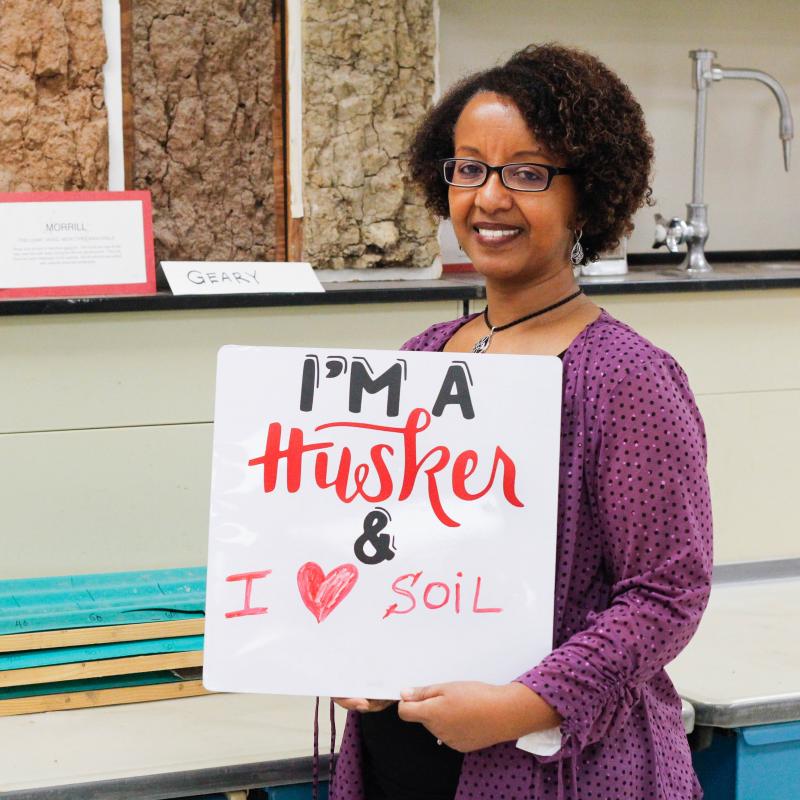
Martha has a deep passion for soil, a resource that most of us take for granted. Her interest was shaped through growing up in Ethiopia where agriculture is the backbone of the country. As a young woman, she knew that if the opportunity arose, she would give back to agriculture in any way possible. After moving to the states as a teenager and gaining several degrees, she started working at Nebraska as a researcher and professor of soil science in 2000. She teaches an entry-level soil resources course and upper-level nutrient management course. Martha says she's "in the business of capacity building," showing students how important studying soil can be. She loves seeing the growth in students as they gain an appreciation and understanding of soil as a natural resource. A few years ago, she traveled to Ethiopia with an interdisciplinary group to collect information from food insecure regions, and the group received additional funding to involve undergraduate students for a study abroad program. Being able to see first-hand what these regions look like was a valuable learning tool for the students. Outside of the classroom, Martha researches how cattle grazing strategies influence soil and enjoys spending time with her three children.
“Martha loves seeing the growth in students as they gain an appreciation and understanding of soil as a natural resource.”
Abla
Assistant Professor of Practice of Arabic Language and Culture · Syria
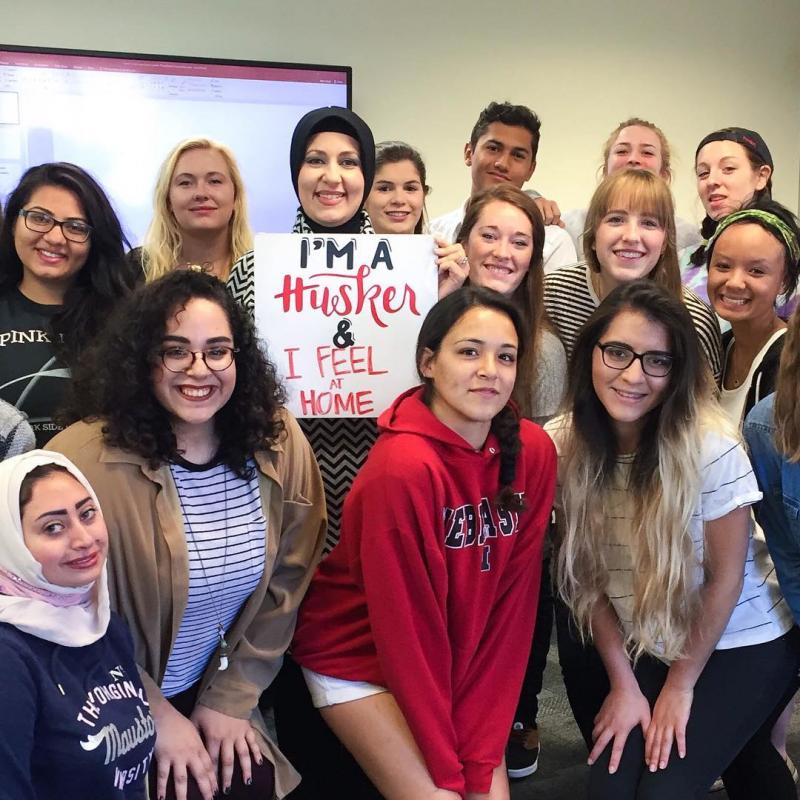
As a hijabi Muslim woman in the middle of the United States, Abla really hasn't felt much different. She and her family have been graciously welcomed into the hearts, homes, churches and temples of the Lincoln community. Being away from Syria for 10 years, she's still surprised when people go out of their way to greet her with "salam alycom," which means "hi" in Arabic, or more specifically, "peace be with you." Efforts as small as these speak volumes to her. Half of her 10 years in Nebraska have been spent teaching at the university. She absolutely loves it, and she created a minor in Arabic studies that offers students three years of language and a new cultural experience. A couple of her courses are Love and Sexuality in the History of Arabic Culture and Women in the Qur'an, bringing Arabic culture to the classroom through media, authentic videos, poetry, music, dancing and food.
“"Efforts as small as saying 'hello' in Arabic speak volumes to me."”